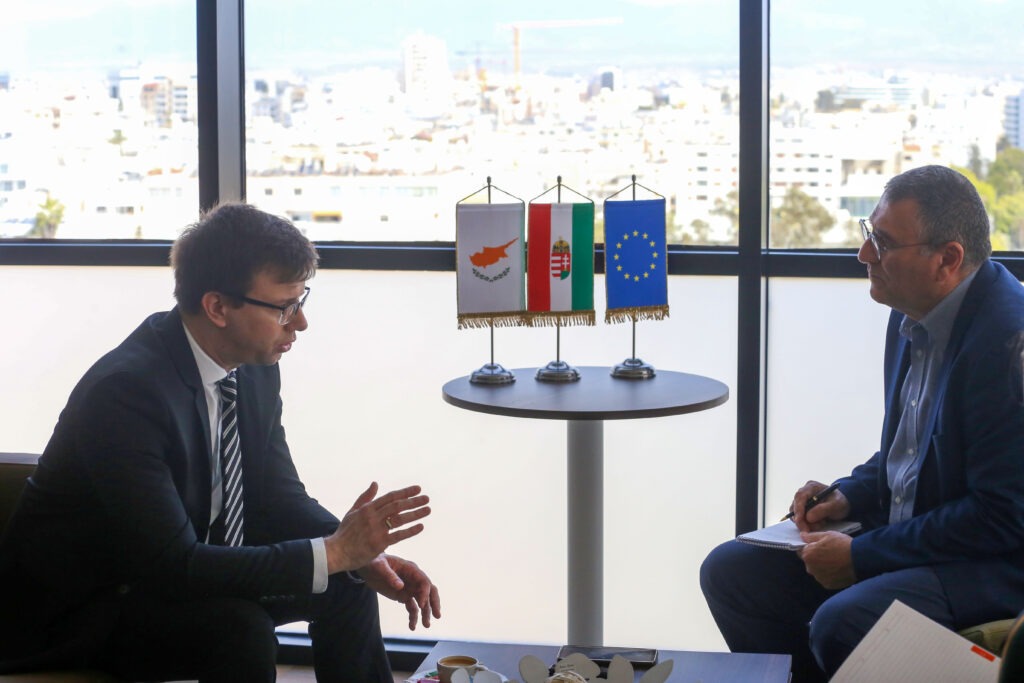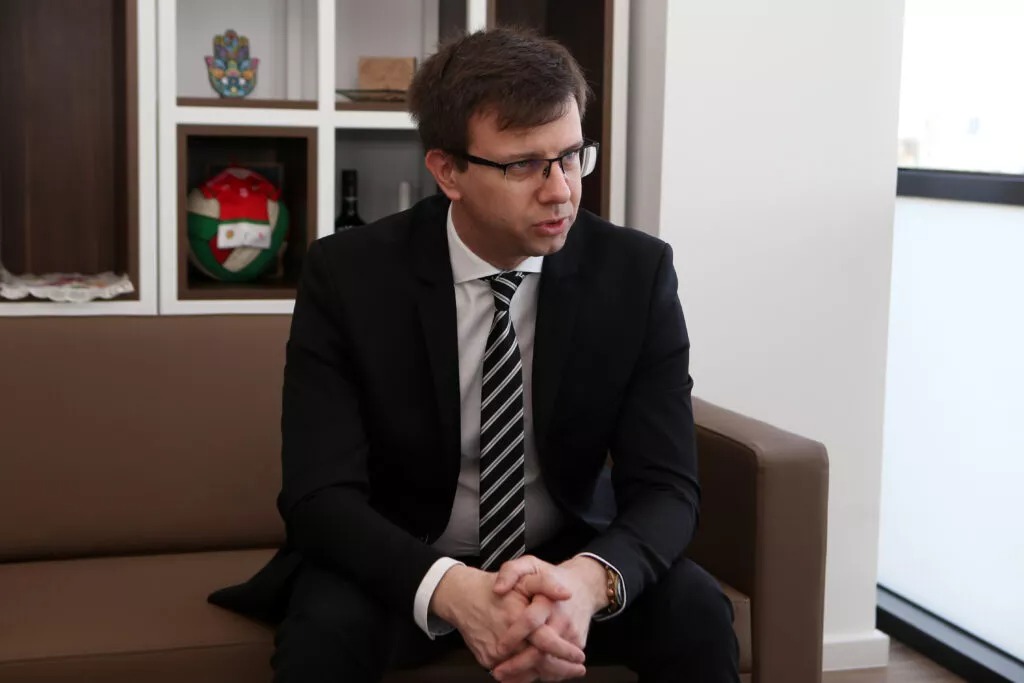Hungary is set to assume the presidency of the European Union on July 1, after the European elections. This transition period will see the election of a new president of the Commission and the formation of the new European Commission and Parliament.
The preparation for the Hungarian presidency, as explained by the Minister for EU Affairs, János Bóka in an interview with Phileleftheros, is being conducted in conjunction with Belgium and Spain.
He added that Hungary wants to see a European Union that makes its member states stronger, and its presidency will focus on consolidating the EU’s strategic interests.
What is the purpose of your visit to Cyprus?
My visit’s primary reason is to prepare for our presidency of the Council of the European Union, which begins on the first of July. I plan to visit each member state at least once before the presidency commences, to discuss with my counterparts their vision for the European Union’s future and to ensure that our presidency programme reflects the priorities and challenges identified by all member states.
At the same time, we want the member states to see Hungary’s presidency as one that manages the institutional transition smoothly. We aim to provide continuity during this new institutional cycle’s beginning.
I will also exchange experiences and expertise with my Cypriot counterpart, which will be very useful, especially as Cyprus will assume the presidency of the EU soon after us.
What are the priorities of the Hungarian presidency and what do you hope to achieve by the end of the year?
From an institutional standpoint, our main priority is to oversee a smooth transition. There are elections to the European Parliament in June, and both the Commission’s and the European Council President’s terms are coming to an end. Therefore, the Hungarian presidency will steer the EU through this transitional period. One of our key tasks is to ensure the continuity of EU activities and that the Union remains responsive to any expected or unexpected challenges that may arise.
The expected challenges include, for example, the approval of the EU budget for 2025, based on the amended multiannual financial framework. This must be done while the institutions are going through a transition period. Unforeseen challenges may also arise, and we are prepared for those, too.
All preceding presidencies had very deliberate plans, yet most of them ended up managing crises, so we are prepared for that eventuality also.
Our presidency’s priorities are rooted in the “triple presidency” programme, which was approved by the Council and developed with Spain and Belgium. Therefore, our focus will be on the EU’s economic competitiveness. We want to address the structural deficiencies that are causing the EU to lose its competitiveness. We aim to integrate the intermediate review of cohesion policy into the discussion on the new multiannual financial framework and, of course, one of our flagship projects will be to enhance European security and defence policy, building on Europe’s defence industry.
Another key area is enlargement. Hungary’s EU policy places a focus on this, and we want to see a continued objective process. We would like to see a balanced approach towards the Eastern partnership countries, particularly Ukraine, Moldova and Georgia, and the Western Balkans, a traditional focus area for Hungary.

One of the challenges currently facing the EU is managing issues outside its borders, such as migration and situations in the Middle East and Ukraine. How can the EU handle these challenges?
Indeed, the European Union also faces challenges from the outside world, some of which are geopolitical and geostrategic in nature.
What I have observed over the past decades is that the EU has lost some of its influence globally and in its immediate neighbourhood. Whether we look at the Middle East, the Western Balkans or the Eastern neighbourhood, we see that the EU struggles to assert its strategic interests.
Therefore, the EU should be able to assess its strategic interests independently and then develop policies to uphold these interests. I believe the Union has a lot to gain by adopting this dual approach, and I hope the Hungarian presidency can contribute to this effort.
Cyprus and Hungary joined the EU on the same day, two decades ago. After 20 years, how do you review your membership in the EU family?
Regarding Hungary’s EU membership, there is no alternative. We are part of the European family, historically, culturally, economically and geostrategically. We belong in the EU, and this belonging has brought us closer together.
However, because we are members of the EU, we want to see it functioning effectively, enhancing the competitiveness of its members and empowering them to face challenges individually. The EU should therefore be seen as a platform for cooperation, which makes its members collectively stronger.
This approach requires significant changes to the way the EU functions so that it strengthens rather than weakens the ability of its members to address the issues that affect them. This requires a shift in mindset and perspective, and I believe the upcoming European elections will emphasise this need. The member states and institutions should then draw the appropriate conclusions.
Do you believe the upcoming elections are more significant for the EU’s member-states or for the Union as a whole?
The elections to the European Parliament are, indeed, elections for an EU institution. I see the European Parliament as a body that has its roles and privileges under the treaties, which must be respected by all institutions and member states. These elections are, therefore, more national elections than European ones, although there are general themes common to all of them.
The campaigns are primarily national, conducted by national political forces focusing on national issues within the framework of European cooperation. However, I do believe that a European trend will emerge after the elections, a significant shift to the right, which may make a re-evaluation of the policies adopted during the current term necessary.
What is the current state of bilateral relations between Cyprus and Hungary?
I believe our bilateral relations are developing remarkably. The official opening of the new Hungarian Embassy premises here in Nicosia next week is further evidence of this, as is the upcoming visit of the Minister of Foreign Affairs and Trade. There is also a number of Hungarians living and working in Cyprus, a number which has grown since Brexit. Cyprus is also a prime destination for Hungarian investment capital. Therefore, the framework for further developing our relations could not be more favourable.
When observing our countries’ relationship in the context of European integration, I note several areas where our interests converge, despite our different geopolitical locations and domestic and foreign policy priorities.
I see many areas where we are very much aligned, including competitiveness, cohesion, European security and defence policy, and migration, particularly the need to address its external aspects and tackle illegal human trafficking, as well as cooperation with partner countries and addressing the root causes of migration.
The #EU should make its member states stronger. https://t.co/izxhs3EIhv pic.twitter.com/iqeMmb3Flg
— Bóka János (@JanosBoka_HU) March 31, 2024






